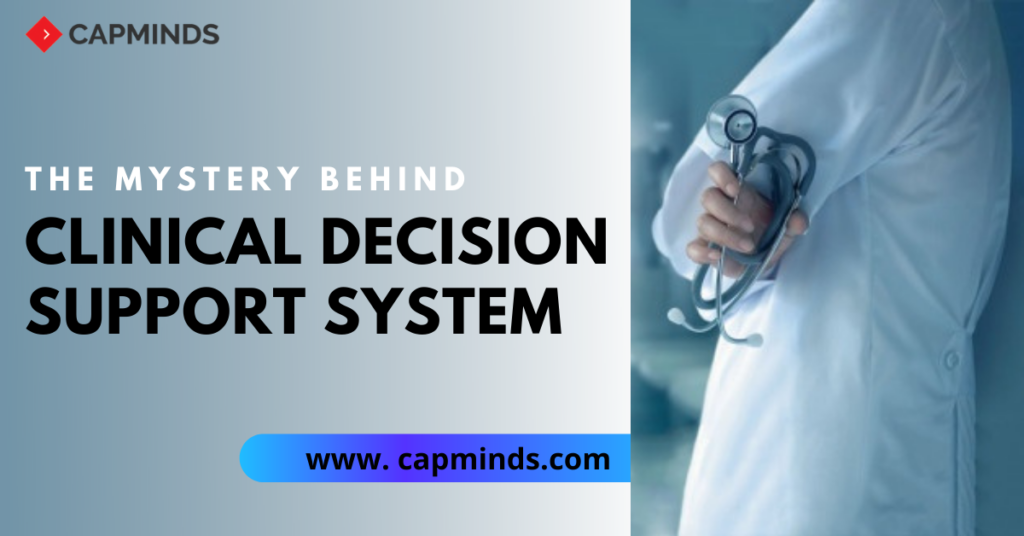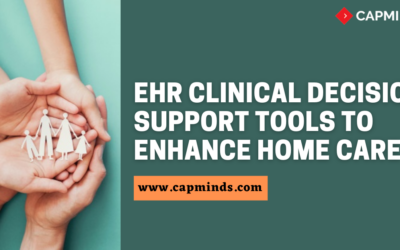The Mystery Behind Clinical Decision Support System
In today’s modern reimbursement environment, the top priorities for healthcare providers include reducing clinical variation and ensuring patient safety. The importance of clinical decision support systems for healthcare providers is becoming very essential as the growing volume of health data increases their goal towards delivering value-based care. In this article, we explain to you the benefits and importance of CDSS in the healthcare industry.
An Overview Of CDSS
The decision support system in the healthcare industry is used to augment healthcare providers in their complex decision-making processes. The CDSS has seen a rapid evolution in recent times as they are now easily administered through Electronic Medical Records (EHR) and other computerized clinical workflows.
The real Secret behind the CDSS is that is intended to improve healthcare delivery by improving medical decisions with targeted patient information, clinical knowledge, and other health information. Despite these growing advances, the secret remains unknown about the effects of clinical decision support has on the clinicians who use them, patient outcomes, and costs. To achieve successful results, knowing everything about CDS tools will help you in better outcomes.
What Are Clinical Decision Support Tools?
Clinical decision support (CDS) tools are specially designed to filter through a huge volume of digital health data to suggest the next procedures for treatments, alert and remind providers, or identify potential issues such as dangerous medication interaction.
The clinical decision support tools are often integrated into the electronic health record (EHR) to streamline clinical workflows and take advantage of available data sets.
In the recent report, HealthIT mentioned that clinical decision support includes a huge range of decision-making aids such as computerized reminders and alerts to care patients and healthcare providers, focused patient data reports, documentation templates, and diagnostic support. The CDS tools are now increasingly leveraging advanced technologies such as machine learning and artificial intelligence – which can ingest a large volume of data, identify patterns and return accurate results to the users.
The other areas where healthcare providers could benefit from CDS tools include:
- Accessing drug formulary guidelines
- Completing drug dosing calculations
- Using severity indexes for specific illnesses
- Accessing educational materials
- Identifying reportable conditions with the help of EHR inputs
RELATED: WHAT IS CLINICAL DECISION SUPPORT SYSTEM?
How Can CDSS Help Your Practice?
An advanced clinical decision support system can help your practice stay on the top without extensive research time. By giving you the latest procedures for the right patients at the right time, these types of clinical decision support can help you provide better care to your patients.
They can also support accurate diagnosis on time, reducing the time and resources associated with the misdiagnosis. The set of basic tools like alerts, reminders, and templates can also improve your practice to reduce medical related errors. Reminders can automatically increase the chances of on-time preventive care for patients. Same way alerts can reduce medication errors and duplicate testing which saves you valuable time and money. Also, forms can help you to have the right documentation for reimbursement which improves practice efficiency.
Although many healthcare organizations are still facing numerous challenges when it comes to creating user-friendly and effective systems for alarms, alerts, and decision-making pathways.
RELATED: EHR CLINICAL DECISION SUPPORT TOOLS TO ENHANCE HOME CARE
How To Implement CDS Effectively?
Measuring the impacts on patient safety, care quality, and provider/patient satisfaction can help to make positive changes to the CDS implementation process. The CMS outlines several key performance indicators which help healthcare organizations to understand the impact of CDS tools.
- Number of patient safety reports or prescribing errors
- Time-to-completion for specified tasks before and after CDS roll-out
- Time-to-order for critical medications/procedures
- The rate at which end-users override alerts
- Reductions in duplicated or unnecessary laboratory tests
Final Thoughts
The clinical decision support system has been shown to assist healthcare providers in decision making and patient care process, especially today they actively support quality healthcare delivery. The support to CDSS continues to grow in the digital age of EHR and there are still more advances to be made in interoperability, ease of implementation, and affordability.
As the evolution of CDS tools keep on increasing, healthcare providers should pay attention to the workflow intersection and clinical analytics when planning for CDSS implementation.
Are you ready to get started with CapMinds Clinical Decision Support?



